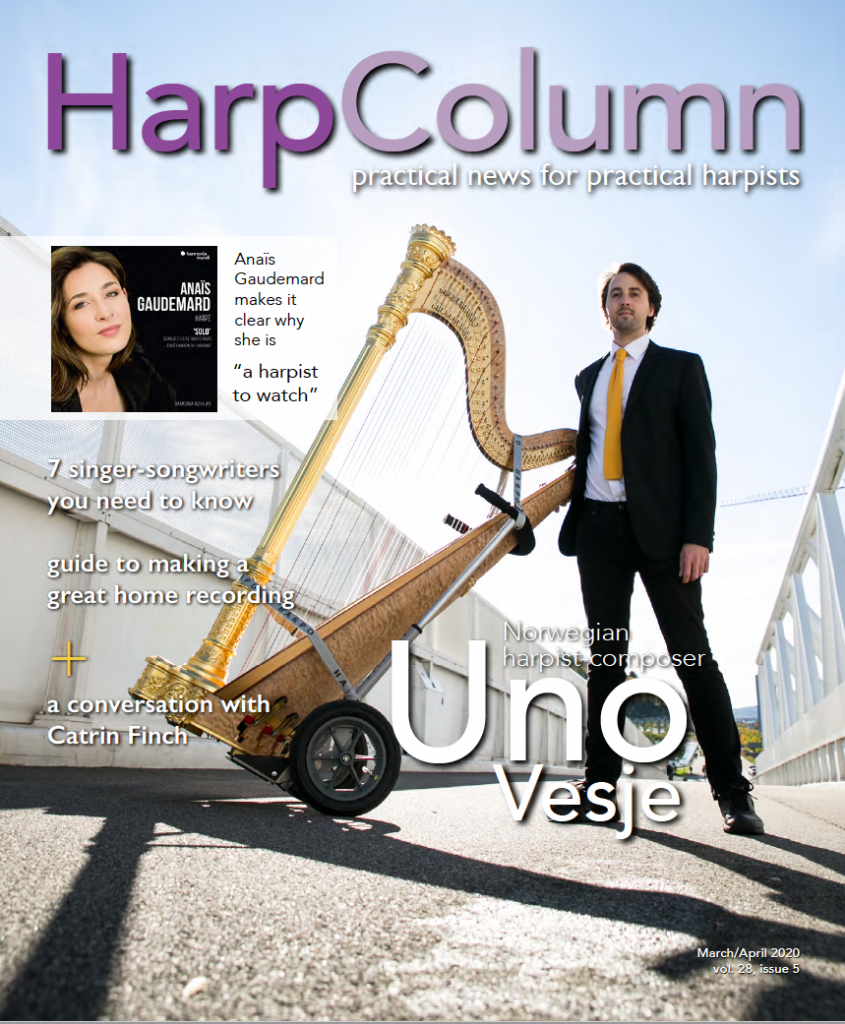—by Emily Granger
It is our habit to think outdoors—walking, leaping, climbing, dancing, preferably on lonely mountains or near the sea where even the trails become thoughtful.
—Friedrich Nietzsche

Thru-hiking is to hike an established end-to-end trail with continuous footsteps in one direction. In 2015, I set out on my first thru-hike: 1,800 miles across New Zealand on the Te Araroa trail. The entire walk took me nearly five months to complete from the very North in Cape Reinga to the Southernmost tip in Bluff. After this life-changing experience, I’ve taken every opportunity to embark on more long walks like the Te Araroa. In 2016, I spent three weeks walking 250 miles on the John Muir Trail in California and a month in 2018 on the Camino de Santiago walking 550 miles across Spain.

I bet you’re asking why in the world a classical harpist with a budding career would risk taking such a long period of time off from playing? Shouldn’t she be spending every day practicing? Isn’t that what it takes to make a great musician?
Well, I desperately needed a break. I wasn’t advancing in orchestral auditions, and my prospects were feeling quite stale. I knew I needed an adventure far away from the classical music world, even if it meant taking a risk that could devastate my career.
While on my hikes, I’ve had time to think while soaking up the clean air. All this has led to more clarity and compassion when I return to my harp. Breathing, hearing the resonance of the harp, and finding inner peace while performing have become so much easier for me.
Thru-hiking is really slow. It takes a massive commitment of time but so does music. Practice is slow going, so I’m no newbie to long, drawn-out, seemingly boring days. For me, having hours on end walking down a trail gives me time to sort things out away from my practice room. It gives me a greater perspective.
“Walking is dull, repetitive and monotonous,” writes Frederic Gros in his book, A Philosophy of Walking (a book I took with me on that first thru-hike). Gros goes on to distinguish between monotony and boredom. Walking is so similar to practicing. Our practice should never be boring. Boring is having no plans, no path to follow, no goals. When you’re walking, or practicing, you’re going somewhere. You’re making progress.
Taking time away from the harp has not only helped me maintain my sanity, but it has also given my hands a real chance to rest. All the tension I’ve held in my wrists and shoulders seems to vanish. I never fully lost my callouses, even after five months. Yes, they were tender coming back to the harp, but I didn’t have to spend months rebuilding them. I’ll spend a solid week or two practicing to get back to feeling normal. I practice the way I encourage beginners to approach the harp: start with five minutes, take a 10-minute break, repeat. I do this every day, gradually increasing the time at the harp until I can play for 40 minutes blister-free and with ease.
If you have the opportunity to take some time off, or if you’re feeling stale or discouraged in your musical journey, I urge you to take some time away from your life as a musician. Meet people from all over the world, people who have never even heard of a harp! (Maybe download some videos of you playing to show them on the trail.) Put your phone on airplane mode, set an out of office auto-response on your email, and give social media a break. Challenge yourself to really listen to the world around you. Hear the steady pulse of your footsteps along the trail, the wind blowing through the trees, the sound of a roaring river or crashing waves of the ocean. Breathe. Feel uncomfortable; get sweaty; get cold. Get very wet. Get Scared. Cry…maybe a lot. Find strength deep within to be comfortable alone and content in your own skin. Go away long enough that you deeply miss being a musician.
One of my most memorable moments from walking the Te Araroa, a moment that has stuck with me and helped me as a musician more than I could have ever imagined, was walking through a valley after the Waiau Pass. This notorious pass is one of the most difficult challenges on the entire trail. People have lost their lives there. The weather has to be perfect and your footing sure.
The amount of focus it took to stay calm and focused was a skill that has helped me immensely as a performer. On the other side of the pass was a massive valley. I had visions of a helicopter dropping my harp down, just so I could hear the acoustics bouncing off the mountains all around me. I settled for singing as loud as I could while skipping down the vast and open trail. I felt alive. I had room to make noise and take up space, something years of city dwelling had squeezed out of me.
I now imagine myself performing in that valley among the mountains, the trees, and creatures. I imagine having to compete with the roaring river to be heard. And this is the place I go when I’m about to perform at the Sydney Opera House, City Recital Hall, and every concert stage I walk onto. I’m not performing just in that room, I’m performing in the mountains. •





